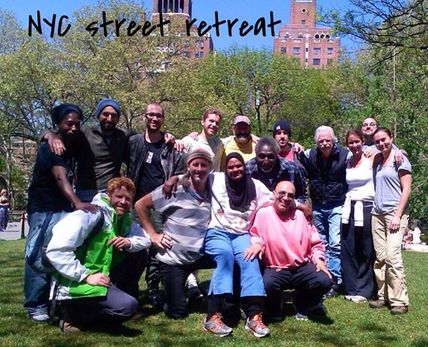
On May 8-11, 2014, I participated in my first street retreat in NYC. We spent three days living, sleeping, and eating on the street. I was able to try out this new way of interacting with people across the class divide.
There are a thousand stories worth telling about the retreat, but I'll focus on one.
Jamila
The first night, during services at the Bowery Mission, a brown-skinned woman wearing a hijab ran up to our retreat leader and screamed with joy, hugging him tightly. This was my introduction to Jamila (name changed). Jamila is 42 years old, and spent 20 years living on the street. She spent some time addicted to crack, which has permanently affected the way she looks. Today, Jamila is sober and lives in a shelter. She has converted to Islam and credits her religion as one of the reasons she is living a more stable and happy life today. She had interacted with people during the previous year's street retreat and this year decided to join us, staying for all three days.
Time for me to confess. Before this retreat, I would have avoided contact with someone like Jamila because she has an unpredictable and powerfully energetic vibe about her. I would be afraid that eye contact might start some sort of screaming session or worse. But here she was, with that same energy, hugging us, loving us, and loudly declaring how glad she was to be with us in the streets.
A Dollar For Your Humanity
On Friday afternoon, in Tompkins Square Park, I wanted to call my family, Erika and Estella. However, as per the rules of the street retreat, I didn't have my phone. As our group stood there in the May sunlight, I asked if anyone knew where the nearest pay phone was. Jamila sprang up and ordered me to follow her.
As we walked, I realized that I had no money (another item we weren't allowed to bring with us). Without hesitation, Jamila reached into her pocket and handed me four quarters, which would get me six minutes of talking time. I thanked her and we arrived at the pay phone. She sat nearby as I called and talked to my family.
Only later did I realize what had happened. Me, a person with class privilege and a materially-comfortable life, had been offered money from a single woman who is living in a shelter, has no reliable source of income, and is an ex-crack addict.
And I had accepted the dollar with real gratitude and no hesitation.
In the past, I would have thought (and maybe even said), "Jamila, I can't accept this. You struggle just to stay above water while I live an easy life. I can't accept this dollar...you need it way more than I do!"
But I had spent time with Jamila, and I had seen the look of pride on her face as she led us through the streets, shouting out to her friends that we passed along the way, finding scaffolding to sleep under, teaching me how to use bubble wrap as padding for my "bed," and doing a hundred other things to help ease our rough (if temporary) transition to the streets.
I was experiencing a re-learning of a timeless lesson: people just want to do something good. By offering me a dollar to call my family, Jamila was helping me to do something important. I really needed that dollar in that moment!
If I were to refuse an offer of help from Jamila, I would be doing it with the intention of not taking resources from someone who doesn't have much money in the first place. But what I would really be doing is denying Jamila's humanity--her desire to do something good for me. I would be grabbing for all of the helping power in our friendship, and I'd be refusing to recognize Jamila's inherent value as a representative of humanity.
Jamila's humanity is worth more than the dollar she gave me...no matter what money situation she's in. And I know that no matter what material wealth I might attain, I will always need help from people around me. It's up to me to practice radical philanthropy: risking allowing others to help me, regardless of our life situations.
 RSS Feed
RSS Feed